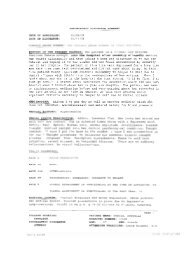C - Organized Mobbing
C - Organized Mobbing
C - Organized Mobbing
You also want an ePaper? Increase the reach of your titles
YUMPU automatically turns print PDFs into web optimized ePapers that Google loves.
7<br />
1<br />
I<br />
516 CHAPTER NINE<br />
long, and intensive contact with a set of people who were SUpposed O be<br />
anti-authorities. Yet they ate with them, drank with them, laughed with th %-I<br />
played with their children, listened to music together, and seemingly shared<br />
their opinions and their feelings. On the other hand, they met one Single<br />
officer, often several times a week, who for the most part was not a friend ,a<br />
buddy, but in crucial ways knew more about them than anybody else. -rhat<br />
officer had to remain a bureaucrat, even if he also once in a while cooked for<br />
them, received them with coffee and sweets at their meetings, but who had<br />
after all, a job to do, a report to write that had to follow a particular script<br />
satisfy his superiors. The dormants were thus sandwiched between people<br />
who thought and acted like friends even though they were supposedly en-<br />
emies, and an officer who was a comrade, who, qua rules and regulatlo,,,<br />
was not supposed to become a friend or even an intellectual partner because<br />
his eyes had to remain fixed to the particular goals of the casework.<br />
n e secret informants' most peculiar social situation helps US to under.<br />
stand a curious phenomenon. After the dissolution of the GDR, when the<br />
former informants were asked by the former dissidents why they had betrayed<br />
them, the informants often said somethng to the effect that they had<br />
only partially betrayed the activists, that they had in fact done both, work for<br />
the groups in which they participated and work for the secret police. They<br />
described their situation as "thoroughly schizophrenic," or as "full of contradictions."<br />
When the Wall fell and the Stasi was dissolved, most of them were<br />
relieved that their double life came to an end (not quite anticipating yet the<br />
ostracization that was soon to follow).<br />
In living and breathing with the movement members, these had, perhaps<br />
imperceptibly at first, often become authorities for the informants. The activists'<br />
recognitions began to count, and they began to transform the informants'<br />
understandings. The Stasi was aware that what anthropologists call<br />
"going nativs" \\-as a constant danger of their informant's work. Therefore,<br />
guidance officers ivere asked to impregnate their informants with a firml'foe<br />
image." They were asked to convince them that the activists were dangerous<br />
carriers of PUT, threatening the socialist project. For example, Hager was<br />
told by her guidance officer that Gerd Poppe had once said that "if matters<br />
were ever to change again, they [presumably the Stasi officers and their informants<br />
and leading party members] would all be hung." Yet, such explanations<br />
did not satisfy all informants, and if they did for a while they lost some<br />
of their credibility in the course of time. Winkler, Miiller, and Kaminski say<br />
in unison that they tried to raise doubts with their guidance officers with<br />
regard to the Stasi's assessment of the groups' dangerousness for the GDR.<br />
They all read the movement members as desiring a reform of socialism as<br />
it was-and that a reform was necessary, they themselves had no doubts.<br />
Most of their guidance officers rigorously blocked such conversations, and





